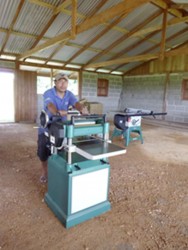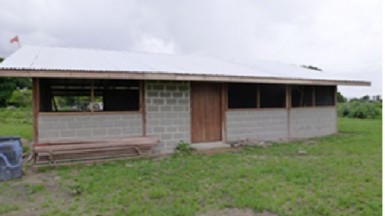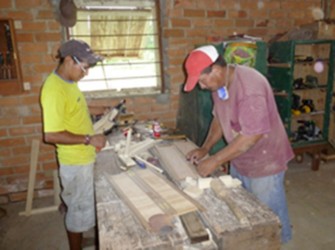The New Zealand government has financed an Industrial Arts Centre focused on carpentry and joinery at Shulinab, South Central Rupununi that will enable residents to tap into the construction industry and capitalise on the growing market at Lethem and in Brazil.
The Arts Centre was formally presented to the community by the New Zealand High Commission Head of

Mission Fund on July 4, a press release said. The centre boasts a new purpose-made building and wood storage facility with electrical power tools imported from the USA, as well as other necessary equipment, tools and accessories that will allow it to operate efficiently and competitively with other professional carpentry enterprises in the region.
The Arts Centre is the only one of its kind in Central and Southern Rupununi and the nearest workshop to Lethem where construction activity is booming since the opening of the Takutu Bridge between Brazil and Guyana, the release said. Shulinab is cognisant that the centre has provided a unique opportunity for them to tap into the growing market.
The projects builds on the success of a previous industrial arts training centre built near the school in 1991 as part of an education initiative facilitated by a local NGO. The training centre in Shulinab had been a popular and successful operating unit, accommodating six to 10 primary school students on weekdays (both during and after school hours) and, partly due to the efforts of a skilled instructor, it now has an above average number of youth with basic carpentry skills.
“The goal of the project is to try and stop our young people leaving our community,” Toshao Vibert Ignace said. “The new Centre will provide high quality vocational training and income generation opportunities, but also allow them to participate, and contribute to the development of their own community.” Ignace described Shulinab as a progressive community that is always looking for development opportunities that would benefit its members.
Nick Fredericks, treasurer for the council explained that the community used this project as an opportunity to learn project management with the support of the volunteer technical advisor Eddie Doyle. “We appointed a project team and had regular meetings to monitor the progress of the project. It was a true learning experience for all of us,” he said.


According to the press release, Roddy Rebeiro and Jason Larose were the two senior project team members who were involved in all aspects of the project design, construction and equipment selection. Both men are looking forward to the challenge of operating the centre. “The first thing we must do is to win a contract for supplying school furniture for our community and the other ones near us. We must prove that we are better than other professional businesses,” Rebeiro said.
“We hope that this initiative will be a model for community development in the future, however the correct level of technical support is essential for communities to execute and manage these programmes in a sustainable way,” Fredericks said.





